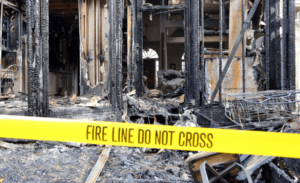
In any property loss situation, there are basic steps to follow to make sure the insurance recovery process goes more smoothly, including documenting everything that was damaged or destroyed and any expenses you incur as part of the mitigation process, in finding alternative living arrangements, and/or in order to keep your company operational. Most insurance companies will pay to repair structural damage and property loss, but some providers will take advantage of your vulnerability and delay, underpay, or deny your fire damage insurance claim or offer a lowball settlement.
What To Do After a Fire Causes Property Damage
While mitigation of additional damage is important, there are also several other steps property owners and insurance policyholders must take after a fire causes property damage to their home or business structures, including:
- Notifying your insurance company and file a claim for loss
- Documenting all the damage that occurred, including taking photos and videos for evidence and proof of loss for your insurance claim
- Saving any and all receipts
- Creating a contents list for the items inside and outside of your structure that were damaged or destroyed
- Verifying your insurance policy is active and what coverage (and potential exclusions) is available
- Proving the property was not vacant at the time of the fire (unoccupied for the prior 30 days) as this can exclude coverage altogether
- Ensuring you get the right repair estimates from the best and most trustworthy providers
- Continuing to pay your insurance premiums
Partial Losses
While according to the Insurance Information Institute, homeowner’s insurance typically pays out more for fire claims than any other loss type, fires that damage but do not completely destroy a home or business create unique issues. These “partial loss” claims come with their own set of obstacles policyholders need to watch out for, including:
- Property damage – both interior and exterior – that can be hidden, such as water, smoke, ash, mold, air quality, and more
- Repairs that prove inadequate since you are not demoing and replacing things entirely
- Repairs that do not return your property to its prior uniform and consistent appearance by replacing undamaged items in order to match the repairs, which is required
Causes of and Types of Fire Damage
Common residential fire damage causes are largely unintentional and include cooking, open flames, electrical malfunctions, appliances, heating, smoking, and the use of candles. Common commercial fire damage causes include cooking/kitchen appliances, human error, arson, HVAC system malfunction, and electrical equipment.
While the structure itself can obviously be severely damaged by a fire, so can a lot of other aspects one might not think about, including landscaping and foliage, outdoor structures like sheds, appliances, clothing, irreplaceable photos and family memories, and more.
Houston Fire Damage Lawyers
Property insurance policies contain complex legal language that can be difficult to understand without a legal or insurance background. Many homeowners and business owners are not aware of their legal rights as policyholders. Contact Minces Rankin immediately if you believe your insurance company is mistreating you. Our experienced trial lawyers have years of combined experience handling insurance disputes across Houston and throughout Texas.
